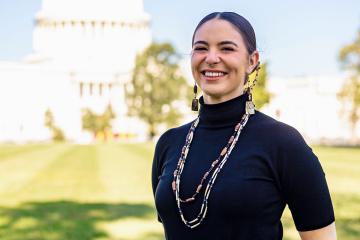- Home
- Graduate
- Academic Programs
- Library and Information Science: Cultural Heritage Informatics Concentration
Library and Information Science: Cultural Heritage Informatics Concentration
Library and Information Science (MS): Cultural Heritage Informatics provides a unique concentration which builds upon Simmons' top rated programs in library and information science and archives management.
Make the past your future
Our students are passionate about cultural heritage in all its forms, including rare books, manuscripts, archives, art objects, and all types of digital information. Simmons graduates are at the forefront in making cultural heritage accessible and in preserving it for future generations.
You’ll gain a solid foundation in collecting, preserving, and exhibiting cultural heritage in both physical and digital form. You’ll apply what you’ve learned in a variety of practical engagement activities in cultural heritage informatics institutions.
Our home in historic New England offers resources and research not found in other parts of the country. Our students find successful careers in varied settings, including library special collections, archives, museums, historical societies and in public as well as private organizations charged with preserving cultural heritage.
Students in the MS (LIS) degree program must complete 36 credits of graduate coursework to be qualified to earn the MS (LIS) degree.
MS (LIS) students must maintain a cumulative Grade Point Average (GPA) of 3.0 to continue in the program.
Students in the School Library Teacher (SLT) concentration must receive a “B” (3.0) or better in every course. Any course in which the student has received a grade lower than a B must be repeated before the candidate may enroll in a practicum or be recommended for licensure. See “Degree Progress and Academic Sanctions” for further information.
Concentrations and Specializations
LIS students may choose to focus their studies by following a degree concentration curriculum designed to prepare students to work in a variety of information institutions with a diversity of materials and tools. Students who choose to concentrate their studies must complete the LIS core courses required of all MS students as well as a sequence of courses required to earn the degree concentration.
Program Requirements
MS (LIS) students are required to complete three courses equaling nine (9) credits of core coursework in library and information science.
| LIS407 | Information Service, Behaviors & Ethics | 3 |
| LIS415 | Information Organization | 3 |
| LIS488 | Technology for Information Professionals | 3 |
| or, if a student is in the School Library Teacher Program (SLTP) | ||
| LIS460 | Technology and the School Library Teacher | 3 |
These core courses must be completed within a student’s first eighteen (18) hours of coursework. SLT students must complete LIS 407 and LIS 415 within their first eighteen (18) hours of coursework and may complete LIS 460 any time during the course of their degree program.
The School has initiated a program to provide a common base of knowledge of the technologies and tools students will encounter during the course of their studies, as well as resources available to them as a Simmons LIS student. All students entering the program are required to register for the 0-credit LIS 400 – Virtual Orientation, which introduces students to the full range of academic, administrative, and social expectations for students, and the environment in which they must meet those expectations. Intended for both online and on campus students, this course describes program requirements; university, school, and program policy; and offers information about the full range of resources available to the students in support of their programs. It also offers basic tutorial and instruction related to the use of Moodle (the learning management system used in online and on campus courses), library resources, and other key tools used to support student learning.
LIS students may choose to focus their studies by following a degree concentration curriculum designed to prepare students to work in a variety of information institutions with a diversity of materials and tools. Students who choose to concentrate their studies must complete the LIS core courses required of all MS students as well as a sequence of courses required to earn the degree concentration.
Archives Management Concentration Course Requirements
LIS core courses (9 credits):
| LIS407 | Information Service, Behaviors & Ethics | 3 |
| LIS415 | Information Organization | 3 |
| LIS488 | Technology for Information Professionals | 3 |
Take the following (9 credits):
| LIS438 | Introduction to Archival Theory and Practice | 3 |
| LIS440 | Archival Access and Use | 3 |
| LIS442 | Establishing Archives and Manuscript Programs | 3 |
One of the following (3 credits):
| LIS433 | Oral History | 3 |
| LIS441 | Appraisal of Archives and Manuscripts | 3 |
| LIS443 | Archives, History, and Collective Memory | 3 |
| LIS456 | Records Management | 3 |
| LIS471 | Photographic Archives and Visual Information | 3 |
| LIS472 | Moving Image Archives | 3 |
| LIS476 | Outreach and Advocacy for Cultural Heritage | 3 |
| LIS506 | Government Archives | 3 |
One of the following (3 credits):
| LIS439 | Preservation Management | 3 |
| LIS444 | Digital Preservation | 3 |
| LIS448 | Digital Stewardship | 3 |
Four elective courses (12 credits)
Cultural Heritage Informatics Concentration Course Requirements
LIS core courses (9 credits):
| LIS407 | Information Service, Behaviors & Ethics | 3 |
| LIS415 | Information Organization | 3 |
| LIS488 | Technology for Information Professionals | 3 |
Take the following (12 credits):
| LIS432 | Concepts Cult Heritage Informatics | 3 |
| LIS438 | Introduction to Archival Theory and Practice | 3 |
| LIS477 | Digital Asset Management | 3 |
| LIS507 | Museum Studies | 3 |
One of the following (3 credits):
| LIS439 | Preservation Management | 3 |
| LIS444 | Digital Preservation | 3 |
| LIS448 | Digital Stewardship | 3 |
Four elective courses (12 credits)
Self-Directed Concentration Course Requirements
LIS core courses (9 credits):
| LIS407 | Information Service, Behaviors & Ethics | 3 |
| LIS415 | Information Organization | 3 |
| LIS488 | Technology for Information Professionals | 3 |
Nine elective courses (27 credits)
Information Science and Technology Concentration Course Requirements
LIS core courses (9 credits):
| LIS407 | Information Service, Behaviors & Ethics | 3 |
| LIS415 | Information Organization | 3 |
| LIS488 | Technology for Information Professionals | 3 |
Take the following (9 credits):
| LIS458 | Database Management | 3 |
| LIS484 | Theories of Information Science | 3 |
| LIS485 | Introduction to Programming | 3 |
Any two from the complete list below (6 credits):
| Systems Oriented | ||
| LIS467 | Web Development and Information Architecture | 3 |
| LIS486 | Systems Analysis in Information Science | 3 |
| LIS487 | Data Interoperability | 3 |
| User Oriented | ||
| LIS421 | Social Informatics | 3 |
| LIS455 | Usability and User Experience Research | 3 |
| LIS462 | Digitization Project Planning and Management | 3 |
| LIS465 | Knowledge Management | 3 |
| LIS475 | Organizational/Information Ethics | 3 |
| LIS500 | Independent Study | 3 |
Four elective courses (12 credits)
Libraries and Librarianship Concentration Course Requirements
LIS core courses (9 credits):
| LIS407 | Information Service, Behaviors & Ethics | 3 |
| LIS415 | Information Organization | 3 |
| LIS488 | Technology for Information Professionals | 3 |
Take the following (9 credits):
| LIS404 | Principles of Management | 3 |
| LIS408 | User Instruction & Information Literacy | 3 |
| LIS453 | Collections Development and Management | 3 |
One of the following (3 credits):
| LIS414 | Special Libraries | 3 |
| LIS450 | Public Libraries | 3 |
| LIS451 | Academic Libraries | 3 |
Five elective courses (15 credits)
School Library Teacher Concentration Course Requirements
LIS core courses (6 credits):
| LIS407 | Information Service, Behaviors & Ethics | 3 |
| LIS415 | Information Organization | 3 |
Take the following (24 credits)
| LIS406 | Management and Evaluation of School Library Programs | 3 |
| LIS459 | Fundamentals of School Librarianship | 3 |
| LIS460 | Technology and the School Library Teacher | 3 |
| LIS461 | Curriculum and Instructional Strategies for the School Library Teacher | 3 |
| LIS481 | Library Collections and Materials for Children | 3 |
| LIS483 | Library Collections and Materials for Young Adults | 3 |
| LIS498 | Practicum (PreK-8) | 3 |
| LIS499 | Practicum (7-12) | 3 |
Two elective courses (6 credits)
Spotlight on Cultural Heritage Informatics Concentration Students and Alums

SLIS Student Receives Josephine Forman Scholarship
School of Library and Information Science Student Rai Terry ’26MS was named the 2025 recipient of the Josephine Forman Scholarship.

Centering Native Stories and Decolonizing Archives
Sage Loyema Innerarity ’25MS, Ione Band of Miwok Indians of California, reflects on her time as a Simmons graduate student — living in Boston, finding community, and taking advantage of professional development opportunities.

Simmons Library and Information Science Student and Indigenous Archives Enthusiast Receives Mosaic Scholarship
Graduate student Sage Loyema Innerarity ‘25MS, a citizen of the Ione Band of Miwok Indians of California, is the 2024 recipient of the Mosaic Scholarship given by the Society of American Archivists.

Meet Sage Loyema Innerarity ’25MS: Emerging Trailblazer in Tribal Archives
This fall, Sage Loyema Innerarity, a citizen of the Ione Band of Miwok Indians of California, began graduate studies at the Simmons School of Library and Information Science. Working in cooperation with Indigenous individuals, she builds and preserves tribal archives. Innerarity spoke with us about the importance of community, Native literature, and remembrance.
Our Faculty

Peter Botticelli
Associate Professor and Director, Cultural Heritage Informatics Concentration

Donia Conn
Associate Professor of Practice

Heather Hole
Professor, disciplines of Museum Studies and Art History
Related Programs
Undergraduate
-
Computer Science + Library and Information Science (3+1)BS, MS
- BS
- MS
-
Information Technology + Library and Information Science (3+1)BS, MS
- BS
- MS
Graduate
-
Children’s Literature + Library Services to ChildrenMA, MS
- MA
- MS
-
History (MA)MA
- MA
-
Library and Information Science (MS)MS
- MS
-
Library and Information Science PhDPhD
- PhD
-
Library and Information Science: Archives Management + HistoryMA, MS
- MA
- MS
-
Library and Information Science: Archives Management CertificateCertificate
- Certificate
-
Library and Information Science: Archives Management ConcentrationMS
- MS
-
Library and Information Science: Cultural Heritage Informatics + HistoryMA, MS
- MA
- MS
-
Library and Information Science: Information Science and Technology ConcentrationMS
- MS
-
Library and Information Science: School Library Teacher ConcentrationMS
- MS
-
Library and Information Science: School Library Teacher LicensureCertificate
- Certificate
